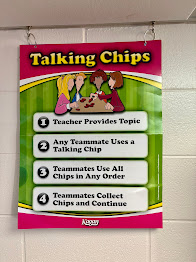Cooperative learning takes place in our 4th grade classroom everyday. Cooperative learning promotes active engagement, enhances students' critical thinking, and fosters social and communication skills. Over the last week, 4th graders have been using Talking Chips in our ELA discussions.
 |
| Classroom Poster |
Talking Chips ensure that every student has an equal opportunity to contribute. Each student is given a small chip, and can only speak once they place their chip in the center. Talking Chips also help students work on their active listening skills. They are not just waiting for their turn to speak - they are genuinely listening to their peers. Because each student is waiting to use their chip, they have more time to process what their classmates are saying. With the help of Talking Chips, our ELA discussions have become more deep and meaningful.
- How does Rob's emotional journey connect with the tiger?
- What motivates Sistine to help Rob, and what does her character reveal about friendship?
- What do you think the tiger symbolizes in Rob's life?
These questions encouraged 4th graders to think critically about a character's motivations, struggles and relationships. During their discussions, Talking Chips helped students be more intentional with their response; they listened carefully to their peers and built off one another's ideas. The Talking Chips also gave 4th graders an opportunity to respect other's perspectives and wait their turn to speak.



No comments:
Post a Comment